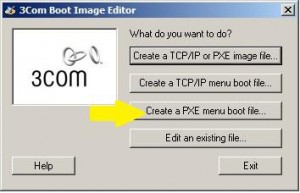

- #Pxe manager for symantec ghost 3.1 not working how to#
- #Pxe manager for symantec ghost 3.1 not working update#
- #Pxe manager for symantec ghost 3.1 not working professional#
- #Pxe manager for symantec ghost 3.1 not working free#
Interesting links: Debian HCL Intel D975XBX, Speed Up Linux Installation (using hdparm).ĭisclaimer and privacy statement / Confidenţialitateĭownloaded debian-501-i386-businesscard.iso* (39 MB, kernel 2.6.26-2-686) from the nearest mirror. In BIOS, set AHCI mode for Intel Matrix SATA controller (modes: IDE/RAID/AHCI).
#Pxe manager for symantec ghost 3.1 not working how to#
I found the following links of great help: Table of PCI device supported by debian, How To Identify A Device.

MODEM (PCIe or USB - no more PCI slots available) Hardware I may/should add, sometimes in the future: LAN3/Wireless - D-Link DWL-G520 rev.B4 (PCI, Atheros AR2414) Sound - SigmaTel /Intel 975X Express Chipset 8-channel HDA (built-in) RAID2/SATA-1 - Silicon Image SiI 3114 (built-in, 4 x SATA ports) RAID1/SATA-2 - Intel Matrix 82801GB/GR/GH ICH7 Family (built-in, 4 x SATA ports) HDD - WD Raptor SATA 74 GB + several others as share drives RAM - Kingston HyperX DDR-800, 2 GB (2x1 GB) Mobo - Intel Desktop Board D975XBX (ICH7, 3xPCIe, 2xPCI, 4xDDR2, 8xSATA)ĬPU - Intel E4600 (Core 2 Duo EM64T, no hyperthreading, no virtualization) However, not everything in there suite my needs, thus I may use packages in other repositories, or hack the system somehow to get it to work the way I want.
#Pxe manager for symantec ghost 3.1 not working update#
As I complete this blog entry, I will update with links - I don't have them at hand right now.ĭuring this setup, I'm trying to follow "the Debian way", using software in the main repository. The Ubuntu community is not always available and responsive like it should. Take, for example, boot messages not shown at startup, for which there is a bug report (I'm not in the mood to look it up right now), and no resolution yet (as of this writing, May 2009). I see they're working to improve many things, and many things get broken. Although I'm not entirely satisfied with the option, it is the best for me at this time.Īfter several Ubuntu Server installations with bogus issues found over time (my experiences), I felt like Ubuntu is not suited for server installation yet ('though it uses latest software and lot of "ring & bells"). * I chose Debian for this project, at least for now. NetBSD 5 (a freely redistributable operating system which its main focus is portability)
#Pxe manager for symantec ghost 3.1 not working free#
OpenBSD 4.5 (forked from FreeBSD, focused on security, correctness, and being as free as possible) - home of projects such as OpenSSH, OpenNTPD, OpenCVS, OpenBGPD, PF firewall and CARP "secured by default" and integrated cryptography FreeBSD 7.2 (most popular BSD OS, very large support for hardware and applications, and base of MacOS-X) Slackware 12.2 (similar to Gentoo, look and feel of BSD)

Gentoo 2008.0 (great for geeks who like to do things the hard way and stay with linux at its base) CentOS 5.3 (Enterprise-class of RedHat/Fedora at the cost of. Debian 5.0 (very close to Ubuntu to which I feel very familiar) * Researching, I decided that I will choose one of the following:
#Pxe manager for symantec ghost 3.1 not working professional#
I'm going use this server for professional services such as hosting web services (DNS, HTTP, FTP, (web)mail etc.), VoIP server, as well as testing other services - media box (sharing, multimedia, streaming), wireless, backup. From the beginning I was wondering which distribution will best fit my needs. Got appropriate hardware for my server and started planning to re-install this box. As I don't like bloat-ware and corporate made distros (that's what I feel in regards to RedHat/CentOS), Ubuntu/Debian seems to be the natural choice - I'll probably stay with one of them. Why do I need pen and paper for partitioning (as per installer's recommendation)? Why is so strange-strange-strange?. Why would anyone in this world has to use the old fashion fdisk? If ones (/developers) decided that fdisk is the best choice for preparing hard drive, why do I get strange questions (regarding geometry) when my HDD has FAT/NTFS partitions on it? It works fine in Windows, DOS and other distros. Com'on guys, the world is changing, and it's changing for good and for better. I was very disappointed of the installer which is the same for centuries. It looks like it's from Mart, it's totally a different species. I wish I didn't add to this list the BSD flavor. Links from above were added for convenience. Thus, I'm splitting it up and I will keep track of articles related. This project evolved and it now (Sep 2009) has many parts which makes updating harder to maintain. I started writing to this article few months back (May 2009), planning to have a weblog of (nice) things I do to this server. Hardware and preparation | OS installation | Console and web monitoring | Network & services | Multimedia | Security Do not link to this page, it might change!


 0 kommentar(er)
0 kommentar(er)
